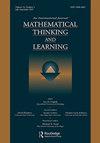Length measurement in the early years: teaching and learning with learning trajectories
IF 1.5
4区 教育学
Q2 EDUCATION & EDUCATIONAL RESEARCH
引用次数: 10
Abstract
ABSTRACT Measurement is a critical component of mathematics education, but research on the learning and teaching of measurement is limited. We previously introduced, refined, and validated a developmental progression – the cognitive core of a learning trajectory – for length measurement in the early years. A complete learning trajectory includes instructional activities and pedagogical strategies, correlated with each level of the developmental progression. This study evaluated a portion of our learning trajectory, focusing on the instructional component. We found that the instruction was successful in promoting a progression from one level to the next for 40% of the children, with others developing positive new behaviors (but not sufficient to progress to a new level). We identified specific characteristics of the interventions’ tasks and teacher–child interactions that engendered learning. The use of standard or multiple nonstandard units may play different roles at different points in the learning trajectory.早期的长度测量:带学习轨迹的教学
摘要测量是数学教育的一个重要组成部分,但对测量的学习和教学的研究还很有限。我们之前介绍、完善并验证了早期长度测量的发展进程——学习轨迹的认知核心。一个完整的学习轨迹包括教学活动和教学策略,与发展进程的各个层面相关。这项研究评估了我们学习轨迹的一部分,重点是教学部分。我们发现,该指导成功地促进了40%的儿童从一个水平到下一个水平的进步,其他儿童则发展出积极的新行为(但不足以进步到一个新水平)。我们确定了干预措施任务和师生互动的具体特征,这些特征产生了学习。标准或多个非标准单元的使用可能在学习轨迹的不同点上发挥不同的作用。
本文章由计算机程序翻译,如有差异,请以英文原文为准。
求助全文
约1分钟内获得全文
求助全文
来源期刊

Mathematical Thinking and Learning
EDUCATION & EDUCATIONAL RESEARCH-
CiteScore
4.40
自引率
6.20%
发文量
18
 求助内容:
求助内容: 应助结果提醒方式:
应助结果提醒方式:


